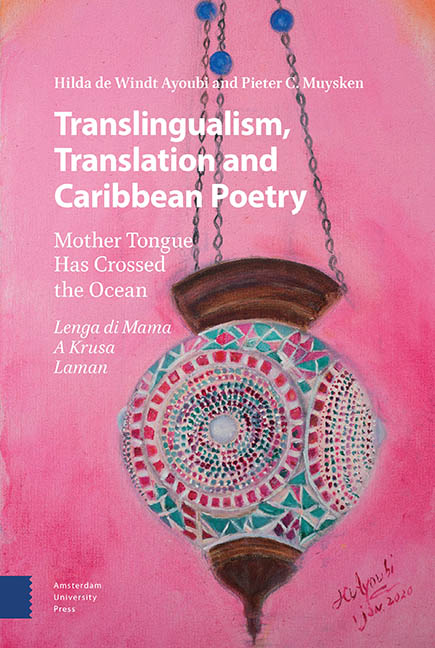Book contents
- Frontmatter
- Dedication
- Contents
- How to Navigate This Book: Kon Nabegá den e Buki akí
- Acknowledgements
- Preface
- Part 1 Introducing the Mother Tongue: Introdukshon di Lenga di Mama
- Part 2 The Poem “Lenga di Mama” and its Translations, Comments and Language Descriptions E Poema “Lenga di Mama” i su Tradukshonnan i Komentario i Deskripshon di e Idiomanan
- Part 3 The Poem “E ‘papiá’ di Papiamentu” and its Translations E Poema “E ‘papiá’ di Papiamentu” i su Tradukshonnan
- Part 4 The Poem “Papiamentu pa Semper” and its Translations E Poema “Papiamentu pa Semper” i su Tradukshonnan: The Translations and Editing of the Poem Hilda de Windt Ayoubi and Pieter Muysken (for Dutch)
- Part 5 The Poem “Riba Ala di Lenga di Mama” and its Translations E Poema “Riba Ala di Lenga di Mama” i su Tradukshonnan
- Part 6 Commentary: Komentario
- Note on the Authors: Informashon tokante e Outornan
- Index: Índise
African and Asian Languages: Idioma Afrikano iAsiátiko
Published online by Cambridge University Press: 15 September 2022
- Frontmatter
- Dedication
- Contents
- How to Navigate This Book: Kon Nabegá den e Buki akí
- Acknowledgements
- Preface
- Part 1 Introducing the Mother Tongue: Introdukshon di Lenga di Mama
- Part 2 The Poem “Lenga di Mama” and its Translations, Comments and Language Descriptions E Poema “Lenga di Mama” i su Tradukshonnan i Komentario i Deskripshon di e Idiomanan
- Part 3 The Poem “E ‘papiá’ di Papiamentu” and its Translations E Poema “E ‘papiá’ di Papiamentu” i su Tradukshonnan
- Part 4 The Poem “Papiamentu pa Semper” and its Translations E Poema “Papiamentu pa Semper” i su Tradukshonnan: The Translations and Editing of the Poem Hilda de Windt Ayoubi and Pieter Muysken (for Dutch)
- Part 5 The Poem “Riba Ala di Lenga di Mama” and its Translations E Poema “Riba Ala di Lenga di Mama” i su Tradukshonnan
- Part 6 Commentary: Komentario
- Note on the Authors: Informashon tokante e Outornan
- Index: Índise
Summary
Abstract
This section features translations into Africanand Asian languages. However, these languages byno means form a unit. Each has very differentcharacteristics both grammatically and in terms oftheir status and oral and written traditions.Grouping our sample of translations this way doesnot, we realize, cover the richness in languagetraditions from these continents.
Keywords: Africa, Asia,Multilingualism, European Colonization
Africa is home to both large and smaller languagefamilies, and some that, as far as we know, areunrelated to other languages altogether. Due to thehistory and legacy of European colonization, mostlanguages of Africa generally do not have a highsocial status in the country. Many African countriesare highly multilingual, with several languages usedin the same community, neighborhood, and evenhousehold.
Similarly, the languages of Asia belong to manydifferent families (including Indo-European which wehave presented separately). As many countries inAsia were not fully under European colonial rule,their languages have generally maintained a highsocial status.
In some cases, the colonial powers did not completelyimpose their own European language onto the localpopulation, but rather gave privileges to the peoplewho spoke their European language, as is the case inDutchcolonized Indonesia.
We begin with a selection of African languages, fromnorth to south in the continent, and then turn toAsian languages.
Tarifiyt is the variety of Berber orAmazigh spoken in the Rif mountain range in northernMorocco and in some communities in Algeria. It isalso a heritage language in Belgium and theNetherlands. Altogether, it may have six or sevenmillion speakers. It does not have much prestige inMorocco itself, although there is a current culturalrevival movement. It is also called Rif or RiffianBerber and many speakers use “Tamazight” to refer toit, but that term is a generic label for all ofBerber. While there is a rich oral tradition, muchof which has been recorded, and/or written, Tarifiytliterature only dates from the twentieth century,and includes short stories, novels, plays,retellings of traditional stories, cartoons, andsongs. Many writers whose first language is Tarifiythave written in the languages of the diaspora:Spanish, French, Dutch, and even English. In Moroccoitself, many Tarifiyt speakers also know Arabic andFrench or Spanish.
- Type
- Chapter
- Information
- Translingualism, Translation and Caribbean PoetryMother Tongue Has Crossed the Ocean, pp. 87 - 112Publisher: Amsterdam University PressPrint publication year: 2022



